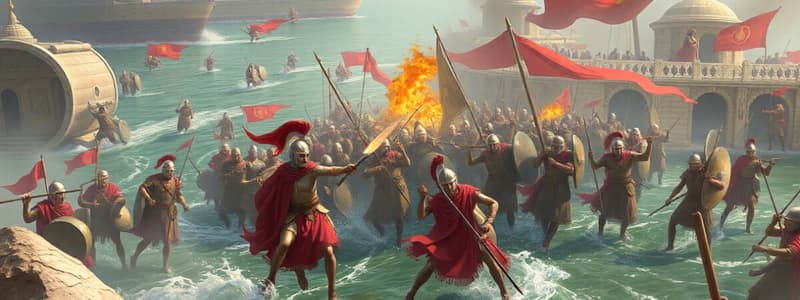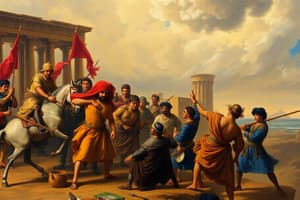Podcast
Questions and Answers
What was a key advantage that the Greek fleet had over the Persian fleet during the Battle of Salamis?
What was a key advantage that the Greek fleet had over the Persian fleet during the Battle of Salamis?
- Unified command structure
- Greater maneuverability (correct)
- Longer range weaponry
- Larger ship size
Which Greek commander played a crucial role in convincing other city-states to engage at Salamis?
Which Greek commander played a crucial role in convincing other city-states to engage at Salamis?
- Leonidas
- Pericles
- Pausanias
- Themistocles (correct)
What factor contributed to the weakened performance of the Persian fleet during the battle?
What factor contributed to the weakened performance of the Persian fleet during the battle?
- Exhaustion from previous battles
- Superior Greek technology
- Excessive training of commanders
- Overconfidence and underestimation of Greek resistance (correct)
What was the primary tactical maneuver the Greeks used against the larger Persian fleet?
What was the primary tactical maneuver the Greeks used against the larger Persian fleet?
Which outcome directly resulted from the Greek victory at Salamis?
Which outcome directly resulted from the Greek victory at Salamis?
In what way did the battle alter the course of the Greco-Persian Wars?
In what way did the battle alter the course of the Greco-Persian Wars?
What was a characteristic of the Persian ships compared to the Greek ships?
What was a characteristic of the Persian ships compared to the Greek ships?
What important legacy did the Battle of Salamis leave for Athens?
What important legacy did the Battle of Salamis leave for Athens?
Flashcards
Battle of Salamis
Battle of Salamis
A decisive naval battle fought in 480 BC between the Greek and Persian fleets in the narrow straits of Salamis.
Delian League
Delian League
The alliance of Greek city-states, led by Athens, that fought against the Persian Empire.
Containment and Ambush
Containment and Ambush
A strategy where a smaller, more maneuverable force uses a narrow space to trap and defeat a larger, less maneuverable force.
Ramming
Ramming
Signup and view all the flashcards
Themistocles
Themistocles
Signup and view all the flashcards
Xerxes I
Xerxes I
Signup and view all the flashcards
Turning Point
Turning Point
Signup and view all the flashcards
Salamis Strait
Salamis Strait
Signup and view all the flashcards
Study Notes
Overview of the Battle of Salamis
- The Battle of Salamis was a decisive naval engagement fought in 480 BC between the fleet of the Delian League, primarily Athens, and the vastly larger Persian fleet.
- It took place in the straits of Salamis, a narrow channel of water between the island of Salamis and the Athenian mainland.
- The battle dramatically altered the course of the Greco-Persian Wars.
Greek Strategy and Tactics
- The Greek fleet, outnumbered but more maneuverable, adopted a strategy of containment and ambush.
- Utilizing the narrow straits of Salamis to their advantage, the Greek ships were able to ram and sink numerous Persian vessels.
- The Greek ships, smaller and faster, were better adapted to the confined waters.
- The Greek commanders, including Themistocles, skillfully exploited the narrow terrain to their advantage.
Persian Strategy and Tactics
- The Persian fleet, while significantly larger, was less maneuverable in the confined waters of Salamis.
- The Persian ships, larger and slower, were less effective in the close-quarters combat characteristic of the battle.
- Miscommunication and a lack of unified command within the Persian forces contributed to their disorganized tactics.
- The Persians were likely overconfident, expecting an easy victory and underestimating the Greek resistance.
Key Figures
- Themistocles, the Athenian general, played a crucial role in the Greek victory.
- He was instrumental in convincing the other Greek city-states to fight the Persians at Salamis rather than attempting a land battle.
- He accurately assessed the Persian forces and the strategic potential of the Salamis Strait.
Casualties and Outcomes
- The Persian navy suffered a significant defeat, losing a large portion of its ships in the battle.
- The Greek victory at Salamis was a turning point in the Greco-Persian Wars, weakening the Persian threat considerably.
- It prevented the Persians from achieving a decisive victory on land and allowed the Greeks to rally for future battles.
- The defeat at Salamis forced the Persian king Xerxes I to retreat back to Asia, but not before leaving significant forces behind in Greece.
- The Athenian navy emerged as the dominant naval force in the Aegean Sea, solidifying Athens' position of power.
Significance and Legacy
- The Battle of Salamis was a significant turning point in the Greco-Persian Wars, marking a vital step towards the eventual Greek victory.
- It highlights the importance of strategic planning, tactical adaptability, and leadership during wartime.
- The battle demonstrated the advantages of smaller, more maneuverable ships in naval warfare, particularly in confined waters.
Studying That Suits You
Use AI to generate personalized quizzes and flashcards to suit your learning preferences.




